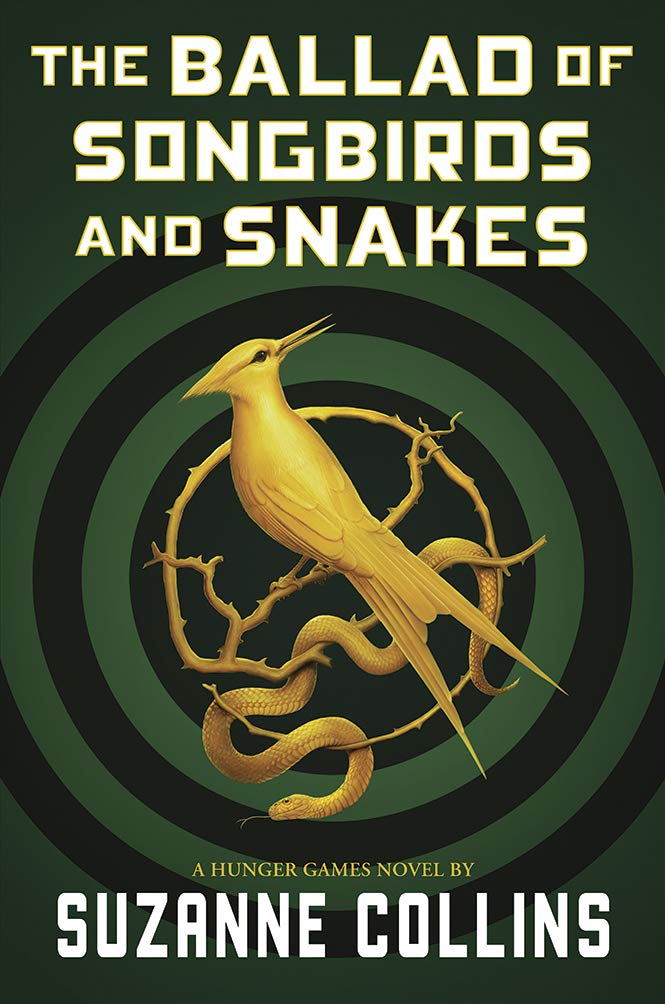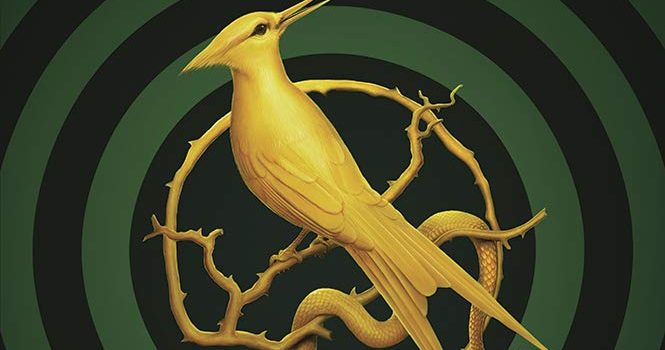Colleen Mondor Reviews The Ballad of Songbirds and Snakes by Suzanne Collins
 The Ballad of Songbirds and Snakes, Suzanne Collins (Scholastic 978-1-338-63517-1, $27.99, 517pp, hc) May 2020.
The Ballad of Songbirds and Snakes, Suzanne Collins (Scholastic 978-1-338-63517-1, $27.99, 517pp, hc) May 2020.
In all likelihood, this is the most unnecessary review I have ever written. It is the end of May and Suzanne Collins’s Hunger Games prequel, The Ballad of Songbirds and Snakes, has already sold 500,000 copies. Few readers are waiting for reviews to decide if this is a book for them. That reality does free me up a bit to answer a different question, however: whether or not The Ballad of Songbirds and Snakes is a book that needed to be written in the first place.
For curious series fans, the new book takes readers back to the teen years of villain Coriolanus Snow. When the book opens, he is an 18-year-old student who has been selected to mentor one of the tributes for the 10th annual Hunger Games. Snow is a hungry orphan barely holding onto his family’s last asset, an apartment, along with his cousin and grandmother. His hope is to gain acclaim through his mentorship and thus financial support to further his education and career. He is not pleased with his assignment, a District 12 singer with little fighting ability, but the two quickly find a way to get along. (Regardless of Collins’s attempts, it’s impossible to classify theirs as a friendship – or more – as Lucy Gray is a tortured prisoner from the moment they meet.) Very quickly, the narrative shifts from preparing for the games to taking readers along as teens on both sides suffer and die. The fighters die from obvious causes: starvation, disease, and then murder during the competition, but there are also explosions that kill teens on both sides, a violent attack that kills one mentor and her attacker, an- other mentor that gets sacrificed as a plot point to develop Snow’s backstory, and one poor kid who ticks off a powerful person and pays the kind of brutal price you cannot imagine. (Oh, and then there’s the kid who is killed and whose body is put on display to start the competition.)
The teens offered up as tribute suffer far more than the mentors, but the book reaches a point where readers begin to suspect that every kid who has a name is going to be at least maimed in some way. By the time the games are over (but the book still has more than 100 pages to go), I was really tired of all the dying. Collins clearly was not. It was time to go off to District 12, where Snow’s last chance at redemption could be dashed forever.
Readers do learn why Snow likes roses and where the hanging tree song comes from. The origins of the games themselves are exposed as well as more about the war. Mostly, though, The Ballad of Songbirds and Snakes explores the many ways in which young people can be tortured (physically and/or psychologically) and how other young people can be manipulated into aiding and abetting in that torture. (It doesn’t reach the level of Stanley Milgram’s experiments, but the mentors know they are participating in an activity that will result in the death of nearly every one of the tributes involved. They don’t try to stop it, they don’t quit, and only a few of them complain. Obedience to authority is the rule.)
The few adults in the narrative support the games for their own nefarious reasons (money and power), but the mentor teens are generally just along for the ride. Their protests never rise above the most basic of levels, and overall, they worry far more about themselves than the kids starving to death in front of them (in a zoo cage, of course). That is what Collins writes about: what it is like to see a group of teenagers be slow-motion murdered, while a lot of other teenagers watch.
By the time you turn the final page of The Ballad of Songbirds and Snakes, you will have witnessed the utter moral failure of Coriolanus Snow and seen him on his way to political power. As for all the other young adults in the book, most of their names will likely be a blur. This is a bleak read about pointless murder that ends with a pile of bodies and no hope. Now we know that from the very beginning, the Hunger Games were stupid, but everybody went along with supporting them because standing up was too hard. Now we know why Snow never stood up. Yay. Another villain’s weak soul has been unnecessarily revealed. Forgive me if I don’t think that was enough to justify reading about so much gratuitous suffering.
Colleen Mondor, Contributing Editor, is a writer, historian, and reviewer who co-owns an aircraft leasing company with her husband. She is the author of “The Map of My Dead Pilots: The Dangerous Game of Flying in Alaska” and reviews regularly for the ALA’s Booklist. Currently at work on a book about the 1932 Mt. McKinley Cosmic Ray Expedition, she and her family reside in the Pacific Northwest and Alaska. More info can be found on her website: www.colleenmondor.com.
This review and more like it in the July 2020 issue of Locus.
 While you are here, please take a moment to support Locus with a one-time or recurring donation. We rely on reader donations to keep the magazine and site going, and would like to keep the site paywall free, but WE NEED YOUR FINANCIAL SUPPORT to continue quality coverage of the science fiction and fantasy field.
While you are here, please take a moment to support Locus with a one-time or recurring donation. We rely on reader donations to keep the magazine and site going, and would like to keep the site paywall free, but WE NEED YOUR FINANCIAL SUPPORT to continue quality coverage of the science fiction and fantasy field.







